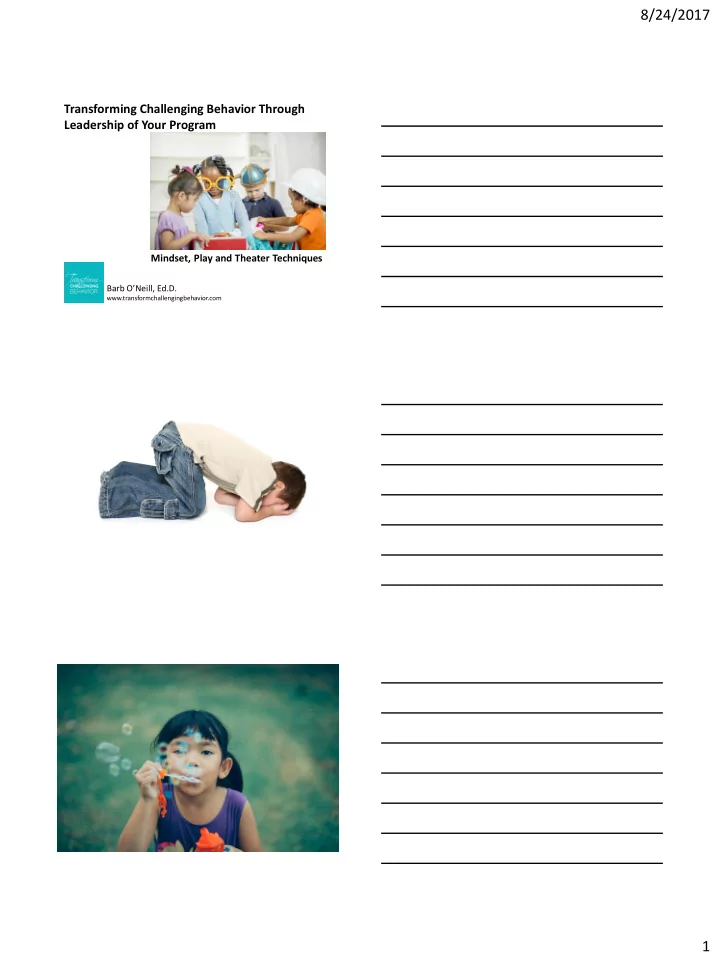

8/24/2017 Transforming Challenging Behavior Through Leadership of Your Program Mindset, Play and Theater Techniques Barb O’Neill, Ed.D. www.transformchallengingbehavior.com 1
8/24/2017 What you’ll learn in this webinar… a mindset activity for staff meetings behavior prevention through play my top 2 tips for family collaboration 3 transition/circle time strategies how to learn more ! www.transformchallengingbehavior.com Get your cheat sheet! Download it for free. Print it. Share it with teachers. Share link w/colleagues. Get info & free resources from me every 2 weeks. 2
8/24/2017 3
8/24/2017 Mindset Exercise You can do this with your staff. BELIEFS about behavior 4
8/24/2017 5
8/24/2017 Fixed vs. Growth Mindset Fixed Mindset Growth Mindset ✓ Avoid challenges ✓ Embraces challenges ✓ Gives up easily when faced ✓ Persist despite obstacles with obstacles ✓ See effort as a path to ✓ Sees effort as fruitless mastery ✓ Ignores useful feedback ✓ Learns from feedback ✓ Threatened by others’ ✓ Inspired by others’ success success intelligence and ability can intelligence and ability are static be developed Carol Dweck Fixed vs. Growth Mindset Early Childhood – Ideas About Behavior Fixed Mindset Growth Mindset ✓ Believe specialists should ✓ Embraces challenging “fix” challenging behavior behavior as part of the job! ✓ Gives up easily when not ✓ Persist despite obstacles seeing immediate results ✓ See effort as a path to mastery ✓ Sees effort as fruitless when ✓ Learns from feedback families don’t follow through ✓ Inspired by others’ success and ✓ Ignores useful feedback open to new ideas ✓ Threatened by others’ success The ability to support children Focused only on lack of who use challenging behavior training and lack of success can be developed Carol Dweck Set a Positive Intention for a growth mindset re: behavior Tips: • write it in the present tense • word it as if it’s already true • “I’m going to …” “I’m trying to…” • Eg . “I am confident and skilled…” 6
8/24/2017 “ I am skilled at working with children who use challenging behavior ” “ The ‘ difficult ’ children are my favorites and I feel gratified helping children and families who are in crisis” “ I have tools to prevent challenging behavior and my confidence and skill is increasing daily ” 7
8/24/2017 Set a Positive Intention I have tools to prevent challenging behavior and my confidence and skill is increasing daily The “difficult” children are my favorites and I feel gratified helping children and families who are in crisis I am skilled at working with children who use challenging behavior Or create your own! POLL families complaining What do you do to prevent families’ from complaining about other children’s behavior? a. Describe our challenging behavior practices in our handbook. b. Proactively tell them: biting is expected in toddler classes. c. Find multiple ways to communicate the above. d. I have taken 2- 3 of the above steps + more e. Oops, maybe I could do more to proactively set expectations. 8
8/24/2017 9
8/24/2017 POLL families not taking recommendations 10
8/24/2017 A good thing to do when a family member does not take your recommendations for preventing challenging behavior is… a. find another way to say it so maybe they’ll understand b. throw my hands up in frustration c. document the unwanted behavior and share daily d. all of the above e. none of the above 11
8/24/2017 12
8/24/2017 13
8/24/2017 PLAY. POLL teachers’ role in play Which of the following are recommendations for how teachers should promote children’s play? a. imitate actions children are doing during play b. take on a role during pretend play; help move the action along c. ask a child to buddy up and play with a child who plays alone d. all of the above e. none of the above 14
8/24/2017 15
8/24/2017 IMITATION NOITATIMI 16
8/24/2017 Imitate and Expand “Yes, and” Prompt interaction between children …maybe ask them to buddy up! 17
8/24/2017 Strategies to Support Play 1. Get in there and PLAY ! 2. Imitate children’s actions 3. Imitate and expand aka “yes, and” 4. Prompt interaction 5. Ask one child to buddy up with another My Top 3 Strategies for increasing engagement and preventing challenging behavior during transitions and circle time 18
8/24/2017 POLL transitions 1. songs with embedded directions 19
8/24/2017 20
8/24/2017 2. start circle time with a movement song Don’t wait till everyone arrives or settles to begin. Build on the interests of children who have trouble at circle time! 21
8/24/2017 POLL circle time CIRCLE TIME what not to do 22
8/24/2017 STOP doing: 1.Attendance 2.Calendar 3.Discussion at circle time if you are seeing behavior challenges during these activities 23
8/24/2017 3. use a puppet…maybe a class puppet 24
8/24/2017 www.transformchallengingbehavior.com Get your cheat sheet! Download it for free. Print it. Share it with teachers. Share link w/colleagues. Get info & free resources from me every 2 weeks. Let me know how it goes! Barb O’Neill, Ed.D. barb@transformchallengingbehavior.com Download the “ Cheatsheet ” for teachers at: www.transformchallengingbehavior.com 25
Recommend
More recommend